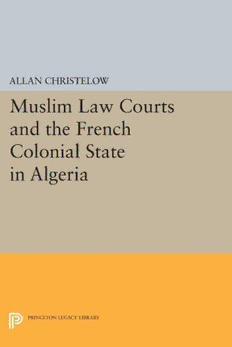
Muslim Law Courts and the French Colonial State in Algeria PDF
Preview Muslim Law Courts and the French Colonial State in Algeria
MUSLIM LAW COURTS AND THE FRENCH COLONIAL STATE IN ALGERIA Muslim Law Courts and the French Colonial State in Algeria ByALLAN CHRISTELOW PRINCETON UNIVERSITY PRESS PRINCETON, NEW JERSEY Copyright © 1985 by Princeton University Press Published by Princeton University Press, 41 William Street, Princeton, New Jersey 08540 In the United Kingdom: Princeton University Press, Guildford, Surrey AU Rights Reserved Library of Congress Cataloging in Publication Data will be found on the last printed page of this book ISBN 0-691-05438-X This book has been composed in Linotron Bembo Clothbound editions of Princeton University Press books are printed on acid-free paper, and binding materials are chosen for strength and durability Printed in the United States of America by Princeton University Press Princeton, NewJersey To Lena, for believing PREFACE The origins of this study go back to the early 1970s, when I taught at Mubarik al-Mili Secondary School, in Annaba, Algeria. Teaching there gave me a firsthand experience in the problems of recovering and revitalizing national values, after what surely ranks as one of the most intensive and violent colonial experiences of modern times. As I began my graduate study, it became clear to me that the Muslim courts were crucial to understanding the impact of the colonial ex perience on Algerian cultural values. And as I pursued my research, it became clear that the impact was a complex one. Along the way, quite a few people have helped me to understand the complexities. My adviser at the University of Michigan, Profes sor Richard Mitchell, was a constant source of encouragement, and a source of sensitive insights on the dilemmas of Islam in the modern world. His death, in September 1983, brought great sadness to me, as a student and a friend. In Paris, Professor Charles-Robert Ageron offered me warm hospitality, and shared his unflagging enthusiasm for historical research. In Algiers, Professor Bilqasim Sa'adallah helped me to understand questions from an Algerian perspective, and stim ulated my interest in intellectual history. I also owe a good deal to conversations with Mahfoud Smati, now of the Centre de Recherche sur l'Archeologie, la Prehistoire et l'Eth- nologie in Algiers; Mustafa Haddad of the University of Constantine; Jean-Claude Vatin of the C.R.E.S.M. in Aix-en-Provence, France, and, presently or formerly associated with the Center for Near East and North African Studies of the University of Michigan; William Schorger; Clement Henry; Amal Rassam; Wil Rollman; Susan Miller; and Emily Byrd. Also at Michigan, Professors Charles Tilly and Raymond Grew contributed to my formation as a social historian. I am indebted to the directors and staffs of the following archives and libraries for their help: the Archives d'Outre-Mer and the C.R.E.S.M. in Aix-en-Provence; the Bibliotheque Nationale, the Bibliotheque de Γ Arsenal, the Archives Nationales, and the Archives of the Ministries of War and Foreign Affairs in Paris; the Biblio- theque Nationale and the Archives Nationales in Algiers; the Ar- viii I PREFACE chives de la Wilaya in Constantine; the Archives Nationales and the Bibliotheque Nationale in Tunis. The original research for this study was carried out in 1975-1976, with the aid of a fellowship and travel grant from the Center for Near East and North African Studies of the University of Michigan. The results appeared in a dissertation which I defended in October 1977. Since then, I have done additional research in the archives at Aix-en-Provence, and in the quite extraordinary collection of works on North Africa in the library of Bayero University, Kano, Nigeria. This book contains very substantial revisions, and an additional chap ter. Portions of Chapter 2 appeared as "Saintly Descent and Worldly Affairs in Mid-Nineteenth Century Mascara, Algeria," in Interna tional Journal of Middle East Studies, 12 (1980), pp. 139-155; a large portion of Chapter 5 appeared as "An Inquiry into the Origins of the Algerian Medjlis Crisis of 1858," in Revue d'historie maghribine, 6 (1979), pp. 35-51; and Section 2 of Chapter 7 appeared as "Career Patterns of Late Nineteenth Century Algerian Muslim Magistrates," in The Maghreb Review, 6 (1981), pp. 36-39. I would like to thank the editors of these journals for permission to republish this material. I would also like to thank Jeanne Dunn for preparing the map. Finally, I wish to express my thanks to the students with whom I have worked, in both Algeria and Nigeria. I learned from them that understanding Muslim society requires that one understand distinct individuals within the society, not making them heroes, but granting them the dignity of historical responsibility. 2 January 1984 CONTENTS Preface vii List of Tables xiii Note on the Transcription of Arabic xv Note on Abbreviations xvi Introduction 3 Law and European Colonialism 3 Islamic Law in the Colonial Setting 5 Historical and Sociological Perspectives 10 The Making of a Colonial Islamic Establishment 23 Structure of the Study 25 1 The Geographical and Historical Context and the Lines of Institutional Change 28 1.1 CONTRASTS BETWEEN EASTERN AND WESTERN ALGERIA 28 The Precolonial State and Religious Education 32 The Marabouts and the Secular Chiefs 34 1.2 THE JUDICIAL PROCESS AND STATE INTERVENTION 35 Ottoman State Intervention in Practice 39 From Islamic to Colonial State Intervention 40 2 Saintly Justice: the Majlis of Mascara, 1853-1856 43 2.1 MASCARA UNDER THE BEYS 44 2.2 'ABD AL-QADIR'S STATE: ITS RELATION TO THE SOCIAL STRUCTURE OF THE MASCARA REGION 46 "Sharifism" and Social Stratification 47 2.3 MASCARA SOCIETY, 1853-1856 54 2.4 THE INSTITUTION: PERSONNEL AND PROCEDURES 56 2.5 AN ANALYSIS OF THE REGISTER 6I Unusual Cases: the Majlis as Mediator 62 Common Cases and Salient Conflicts 66 Acts of Violence 66 Maniage 67 Divorce 71 Shafa'a (Pre-emption) 72 Mobile Property 78
